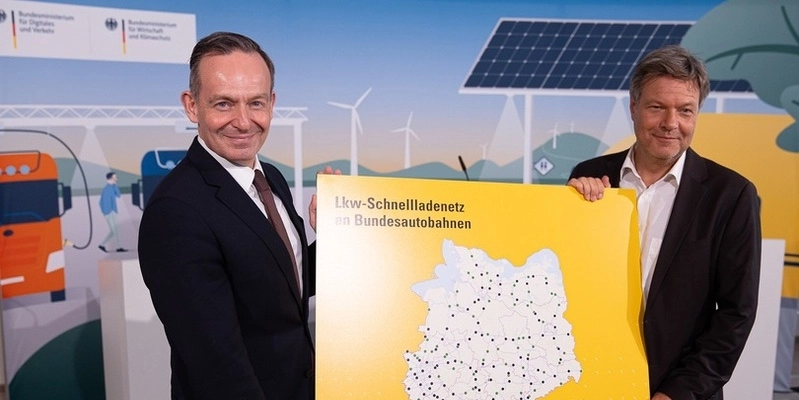Electric mobility remains one of the fundamental pillars in Germany’s decarbonization strategy. Therefore, Federal Ministers of Transport, Volker Wissing, and of Economy, Robert Habeck, have initiated the development of the first rapid charging network for electric trucks.
However, this initiative faces a crucial paradox: there are no incentives for the purchase of this vehicles.
It’s worth mentioning that the project aims to establish a “comprehensive, needs-based, and user-friendly charging infrastructure.”
This plan, jointly announced by the Federal Ministry of Transport (BMDV) and the Federal Ministry of Economics and Foreign Affairs (BMWK), seeks to accelerate the growth of the heavy-duty electric commercial vehicle market.
The envisioned infrastructure includes 350 selected locations, both managed and unmanaged, where 4,200 Megawatt Charging System (MCS) and Combined Charging System (CCS) points will be installed.
This network will initially roll out at unmanaged rest areas due to pending litigation (Tesla/Fastned against).
A decision on this case is expected soon at the Court of Justice of the European Union (CJEU).

Despite progress in infrastructure, the federal government has abolished subsidies for electric trucks due to Germany’s budgetary turmoil.
This decision has drawn criticism and concern from the transportation industry, which considers financial support crucial for zero-emission vehicle adoption.
Without incentives, the purchase of eTrucks becomes unfeasible for many businesses, especially medium-sized ones that cannot bear the high initial costs without government aid.
It’s noteworthy that additional costs for an eTruck are significantly higher than for a diesel unit.
The cancellation of the KsNi funding program, which covered up to 80 per cent of the additional costs compared to combustion vehicles, has left many firms in precarious financial situations to face this investment.
The increase in tolls for diesel trucks, intended to encourage a shift to cleaner technologies, has also proven insufficient.
Industry stakeholders, such as the Federal Association of Logistics and Freight Transport (BGL), among others, have expressed concern over the policy framework slowing down the decarbonization of road freight transport.
To reverse this trend and achieve climate goals in transport, industry associations propose several measures.
Firstly, reforming fuel taxes by adjusting them to reflect the climate impact of biofuels and electricity-based fuels, offering fiscal advantages to cleaner options.
Secondly, reinvesting toll revenues, arguing they should fund road freight transport transformation, bridging economic gaps in companies.
Thirdly, accelerating the expansion of charging infrastructure at non-public logistics facilities.
Additionally, subsidizing the purchase of electric and hydrogen commercial vehicles, with incentives tailored to company size and designed to phase out over time.
How is the transition to eTrucks progressing in Germany?
Current registration figures for these vehicles are low, representing only 0.07 per cent of the 800,000 registered automobiles over 7.5 tonnes.
In the first four months of the year, registrations of new heavy electric vehicles increased by 173.7 per cent compared to the same period in 2023, according to the European Automobile Manufacturers’ Association (ACEA).
However, technology is advancing and technological barriers, such as range and the ability to transport hazardous goods, are being overcome, making these no longer excuses.
The key to the success of the rapid charging network for electric trucks lies in a comprehensive approach combining infrastructure development with adequate financial incentives.
BGL emphasizes that without government support, the adoption of eTrucks will be slow, and “the goal of decarbonizing freight transport may not be achieved within the expected timeframe.”
In this regard, the German government’s effort to develop a rapid charging network for this vehicles is a positive step towards transport decarbonization.
Thus, the lack of purchase incentives poses a contradiction that could hinder progress.
To ensure the network’s effectiveness and facilitate the logistics sector’s necessary transition, restoring subsidies and providing a solid financing framework is crucial.








